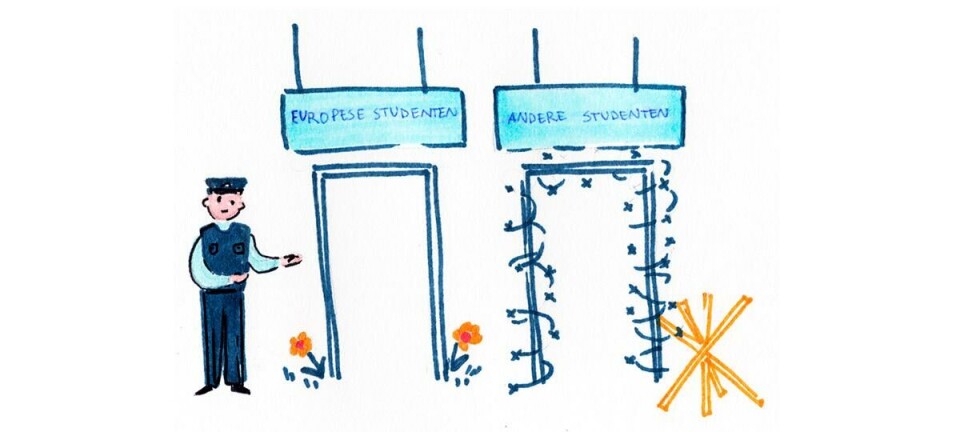analysis> From next year, non-EEA students must demonstrate they have an extra 3000 euros
'Student visas are proof that you have money'

Recently proposed changes to the admissions policy for internationals to the KU Leuven are raising concerns amongst students. They fear that wealth will determine who gets to be here.
On Friday, March 4, the Student Council presented its conclusions on a number of measures put forward by the KU Leuven admission office. Those measures, aimed at increasing the entry requirements for both European Economic Area (EEA) and non-EEA students, were largely disapproved by the General Assembly.
The right kind of international student
For example, the rejected proposed measures include raising university English proficiency to the C1 level, regardless of faculty. The introduction of the Graduate Record Examinations (GRE) and the tightening of application deadlines were also rejected. Only one measure has the support of the council: the non-binding placement test, but there too there are concerns about the logistical aspects of the requirement.
According to Christiana Galani, Stura representative for international affairs, the proposed changes are part of a continued policy of the international office to gain a more direct control of the type of students who attend. 'The university is looking for higher quality students, and higher quality may mean more admission requirements.'
'We want students to start a program with a good prospect of success'
PETER LIEVENS, VICE RECTOR FOR INTERNATIONAL POLICY
Vice Rector for International Policy, Professor Peter Lievens, explains that the requirements are needed to better assess the abilities of both EEA and non-EEA students, as they stem from outside the Belgian system. 'We want students to start a program with good prospects of success by ensuring that they end up in a program that suits them.'
'Higher education serves to help students move forward in life, and sometimes it is quite clear that the student cannot achieve that progress', says the vice rector. 'A realistic estimate of the chance of success is therefore an important parameter in a fair admission policy,' he concludes.
One of the main reasons for Stura to oppose the new requirements is that they are flawed: they favor students with financial resources, because they can prepare themselves or because they have extensive prior education. 'In the long run, this will simply become more a question of who can take exams well rather than who is a good student,' the general assembly writes in its notes. In addition, Veto reported last year that a university degree is often hereditary.
'From next year, international students must make 11,500 euros available at the start of the year'
PETER LIEVENS, VICE RECTOR FOR INTERNATIONAL POLICY
This is certainly not the only hurdle that often disadvantaged non-EEA students have to overcome. One of the financial requirements that students must meet in order to obtain a student visa is proof of solvency. They must demonstrate that they have enough financial means to study and support themselves while in Belgium.
40% of students currently use the blocked account method, where an amount is transferred in full at the beginning of the academic year. Until this year, that amount was 8,500 euros and is intended to simulate the basic cost of living. In other words, this is not including the tuition fee.
Stricter financial requirements
Starting from next year, this ammount will be increased. 'All students who start a new study program from academic year 2022-2023 are now expected to make 11,500 euros available at the beginning of the year,' confirms Vice Rector Lievens. It is important to mention that the decision on this was not made by the Ministry of Foreign Affairs, but among the Flemish universities.
Of the five non-EEA students we interviewed about this issue, four said they would not have been able to transfer the increased amount and were already struggling to collect the current sum. Anica Rimac, a Anthropology bachelor's student, questions the rational behind this change. 'Is the goal to live comfortably or to get an education? The increase will ensure that less well-off students will most likely not get a place. The loss of diversity could be a disadvantage for the university.'
'We prefer to create a stronger safety net for the weakest students first'
CHRISTIANA GALANI, STURA MANDATARY INTERNATIONAL
Tulya Su Guven, a master's student in Anthropology from Turkey, says that, in addition to the relatively high proof of solvency, the high tuition fees also played a major role in her choice of university. 'In the end I chose the KU Leuven because the master's programs I was interested in was 1,000 euros here, while it 3,000 euros at the Vrije Universiteit Brussel'.
The cost of program is a factor for countless underprivileged students from abroad seeking the advancement that higher education should provide. They all agree that the increase will only damage the ability of future generations to study here. 'I wouldn't have had the money to study here under these new rules,' admits Anica.
Scholarships and tuition waivers
The election program of Rector Luc Sels and Vice Rector Lievens reaffirm their commitment to expanding the already existing systems for financial aid. 'There are already a number of scholarships for students that are particularly strong or aimed at countries from the global south, at faculty level as well as from the Flemish government,' he explains. 'We are now exploring how we can expand them, but that will of course cost money.'
According to the vice rector, alumni donations are a promising method for this. However, Stura points out that it would have been fairer to provide a more comprehensive system of scholarships first if the price for students were increased. 'We prefer to create a stronger safety net for the weakest students first,' Christiana notes.





